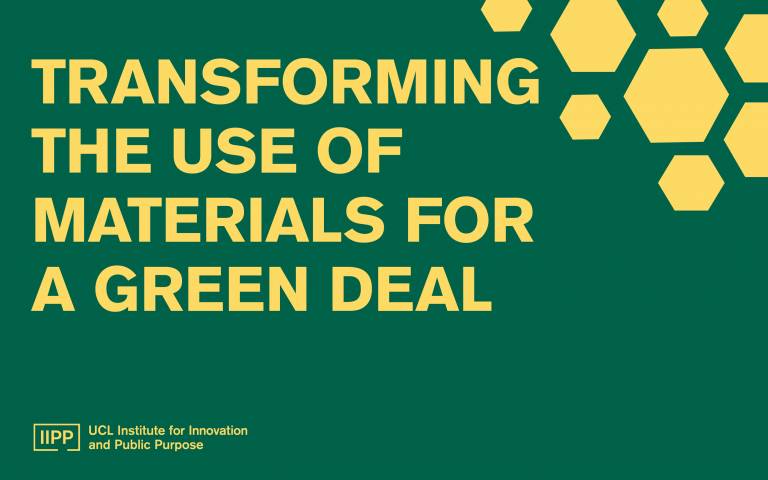
Our use of materials such as concrete, steel and textiles will need to change as we move towards a carbon-neutral economy. In the context of the Green Deal, will innovative place-based approaches that change our use of materials while also maximising social welfare, be key?
Event Information
Open to
- All
Availability
- Yes
Organiser
-
IIPP Comms Team
Our use of materials such as concrete, steel and textiles will need to change as we move towards a carbon-neutral economy. This is a complex field, where a life-cycle approach to material extraction, production, consumption and re-use is required. How can governments tilt the playing field towards a smarter use of materials? Is it possible to decouple growth from increased material consumption, while also maintaining jobs and social cohesion? Some industrial sectors are making progress, with architects now measuring the ‘embodied carbon’ in buildings, and the textile sector revaluing simpler materials that can be more easily disassembled. How can governments effectively use taxes, regulations and other incentives to ensure more widespread change? In the context of the Green Deal, will place-based approaches that change our use of materials while also maximising social welfare, be key?
Follow the conversation on Twitter: #IIPPGREENMATERIALS
Watch the video
About the Speakers
Carlota Perez
Honorary Professor at UCL Institute for Innovation and Public Purpose
Carlota Perez is a pioneering scholar on the role of innovation and an Honorary Professor at IIPP. Her focus is on the socio-economic impact of technical change and how it transforms opportunities for growth and development. Her 2002 book ‘Technological Revolutions and Financial Capital: The Dynamics of Bubbles and Golden Ages’ had a great influence on our understanding of role of finance in the emergence and diffusion of technological revolutions and the connection of this to financial crises. She is currently working on Beyond the Technological Revolution, a four-year research project funded by Anthemis UK, which builds on her past work by further examining the role that government and civil society play in shaping technological revolutions. Her career began in the Venezuelan civil service and she has consulted for governments, international corporations and multilateral organisations. More about Carlota Perez
Saskia Sassen
Robert S. Lynd Professor of Sociology, Columbia University
Saskia Sassen is the Robert S. Lynd Professor of Sociology and former Chair, Committee on Global Thought, Columbia University. She can be reached at sjs2@columbia.edu. Her books include Expulsions: Brutality and Complexity in the Global Economy (Harvard University Press, 2014; translated into 12 languages); Cities in a World Economy, 5th fully updated edition (Sage); Losing Control: Sovereignty in an Age of Globalization, The Schoff Memorial Lectures, Columbia University Press 1995; New updated edition 2016; Territory, Authority, Rights : From Medieval to Global Assemblages (Princeton University Press, 2008); A Sociology of Globalization (W.W. Norton, 2007); The Global City, (Princeton University Press 1991); The Mobility of Labor and Capital (Cambridge University Press 1988).
Tanushri Shukla
Social entrepreneur and sustainability consultant with a focus on the textile and apparel industry
Tanushri is a social entrepreneur and sustainability consultant with a focus on the textile and apparel industry and has expertise in innovative textile waste management practices & systems and social impact generation. She also has a background in digital product development and content strategy. Over the course of 10+ years, she has worked in various capacities to handle business development, communications, strategy, sustainability and enterprise design across India, the UK, and the US. She currently works at the Circular Apparel Innovation Factory (CAIF), Intellecap’s industry-led initiative focused on driving circularity and sustainability in the textile and apparel industry. Here she focuses on developing multi stakeholder programs to address ecosystem level challenges in India's textile and apparel industry alongside knowledge management, stakeholder engagement and enterprise support. She is also founder of Chindi, a social enterprise providing design-led solutions for textile waste through livelihoods generation for low-income craftspeople in India.
Dan Hill (Chair)
Visiting Professor of Practice at the UCL Institute for Innovation and Public Purpose (IIPP) and Director of Strategic Design at Vinnova
Dan Hill is Director of Strategic Design at Vinnova, the Swedish government’s innovation agency. A designer and urbanist, Dan’s previous leadership positions have produced innovative, influential projects and organisations, ranging across built environment (Arup in Australia and UK, Future Cities Catapult in UK), education and research (Fabrica in Italy), government and social innovation (SITRA in Finland), and media (BBC and Monocle in UK), each one transformed positively via digital technology and a holistic approach to design. He has lived and worked in the UK, Australia, Finland, Italy and Sweden. As well as being Visiting Professor of Practice at IIPP, Dan is also a visiting professor at Design Academy Eindhoven, an adjunct professor at RMIT University in Melbourne, and one of the Mayor of London's Design Advocates. He is the author of the influential playbook, “Dark Matter & Trojan Horses: A Strategic Design Vocabulary” (Strelka Press, 2012). He writes at https://medium.com/@cityofsound.





 Close
Close

